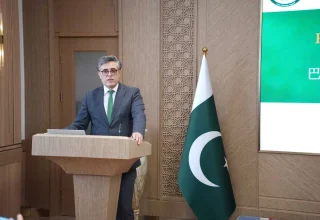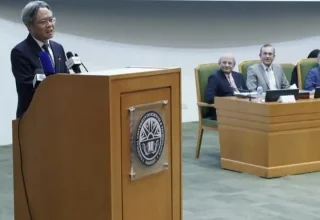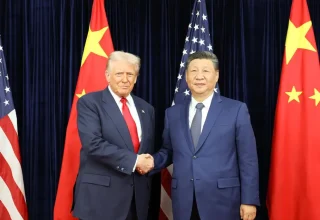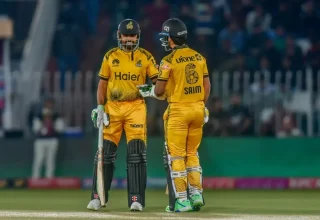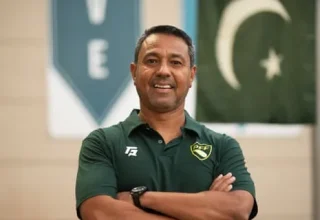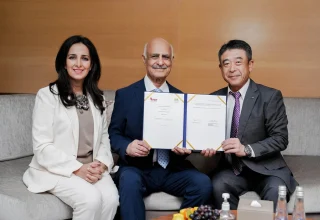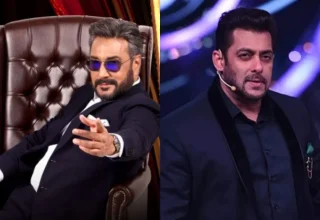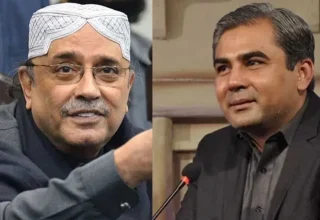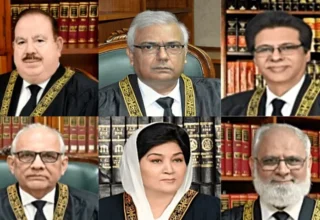
The Supreme Court has conditionally suspended its earlier verdict that declared the trial of civilians in military courts null and void.
The court announced its decision with a 5-1 majority. Justice Musarrat Hilali opposed the majority decision. The SC ruled that the military courts will not pronounce final decisions on the trials underway.
It allowed the military courts to proceed with the trials, but said their final decisions would be conditional to the Supreme Court verdict.
A six-member larger bench, headed by Justice Sardar Tariq Masood, heard the appeals. The bench also included Justice Aminuddin, Justice Hassan Azhar Rizvi, Justice Muhammad Ali Mazhar, Justice Musarrat Hilali and Justice Irfan Saadat.
The larger bench also issued notices to the parties in the intra-court appeals and adjourned the proceedings till the third week of January.
As the court resumed hearing the intra-court appeals on its verdict against the trial of civilians in military courts, head of the bench, Justice Sardar Tariq Masood, refused to step down from the bench over objections by one of the applicants.
The intra-court appeals have been filed by the federal and provincial governments, as well as the Defence Ministry. The federal government has also sought a stay on the court verdict as well as appealed for declaring the decision null and void.
Former chief justice of Pakistan Jawad S Khawaja is also among the applicants and had objected to the inclusion of Justice Masood in the bench hearing the case. He filed a petition before the court, challenging Justice Masood’s participation.
Khawaja expressed reservations over Justice Masood’s prior opinion on the applications related to military courts. He proposed the formation of a fresh bench by the judges’ committee.
The petition outlined that both Chief Justice of Pakistan Qazi Faez Isa and Justice Masood had recused themselves from a nine-member bench hearing these cases. Justice Masood’s previous opinion, signed on June 26, deemed the petitions against military courts inadmissible.
As the hearing commenced, Justice Masood refused to step down from the bench, citing the applicant’s own earlier decision that recusing from a bench was a judge’s prerogative.
“Pardon me, but I do not step down from the bench,” Justice Masood insisted and rejected the former CJP’s objection.
Latif Khosa said they had an objection to the bench. Justice Masood asked if they had been issued notices. When the parties are issued notices, their objections will be heard.
Defense Ministry’s lawyer Khawaja Haris started presenting his arguments and read the court verdict. The entire section of a law has been declared invalid in two lines, Justice Masood remarked.
The lawyer said these provisions were previously retained in the Supreme Court’s decisions. An eight-member bench retained these provisions in the FB Ali case.
In the latest decision, the provisions were declared null and void by the majority of 4-1, he further said, adding that these provisions were also maintained in the 21st Constitutional Amendment case.
The court also stopped Aitzaz Ahsan, Salman Akram Raja and Latif Khosa from presenting arguments, saying they had not been issued notices yet.
Salman Akram Raja said if that was the case, then a stay order should not be issued.
In the recent decision, the provisions were nullified by a majority of 4-1, Khawaja Haris argued, adding that civilians also include people like Indian spy Kulbhushan Yadav. The jurisdiction over civilians was already limited in the Army Act. The provisions related to civilian cannot be revoked, he maintained.
Justice Masood said they did not have the detailed decision of the Supreme Court yet, and asked what will happen to the civilians involved in Tuesday’s attack in Dera Ismail Khan in which soldiers were martyred. The court then asked if the trials were complete.






